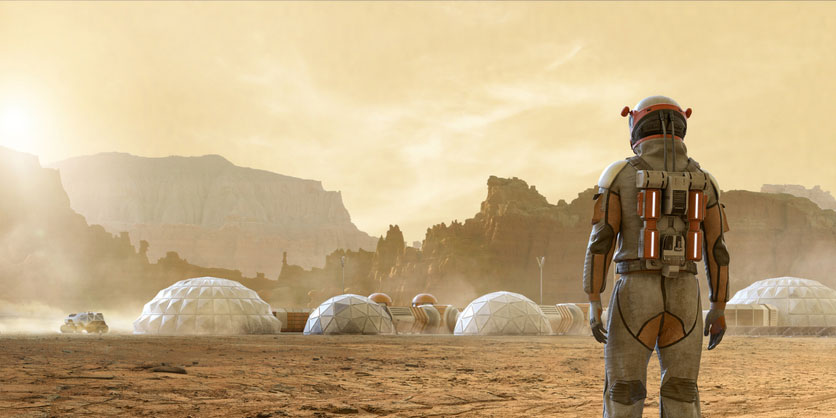Written by Scott Wilson

If your mind is overrun with thoughts of malevolent AI developing sentience and eradicating humanity, attack ships on fire off the shoulder of Orion, or visions of moons shattering in the night sky, then you’re more than likely already building new universes as a science fiction writer.
A realm of unlimited possibility, plumbing the depths of past, future, and other dimensions, science fiction is the land of big ideas. Yet as far-ranging as its oeuvre is, science fiction is and almost always has been indelibly tied to the world of today.
In every era, sci-fi has been a convenient mirror to hold to society and culture. H.G. Wells unpacked the class structure of Victorian England through his depiction of the Eloi and Morlocks in The Time Machine; 1984, by George Orwell, is a timeless commentary on totalitarian rule, mass surveillance, and repression inspired by Nazi Germany and the Soviet Union.
Science fiction represents a venue for big thoughts about the future—not just the technologies and scientific developments it holds, but the effects they will have on society.
Whether you have something to say about race or gender that is best explored through the lens of a few thousand years, or just a rollicking tale about freebooting space pirates ranging through distant nebulae in search of alien treasure, there’s a home for you in science fiction. A creative writing degree offers the professional training you can use to get those thoughts out of your head and into print.
Infinite Possibility Makes Science Fiction Hard To Define but Liberating To Write
 There has never really been an entirely satisfactory definition of science fiction. In part, that’s because it is a genre of the imagination that has no real limitations. Many famous sci-fi authors have tried:
There has never really been an entirely satisfactory definition of science fiction. In part, that’s because it is a genre of the imagination that has no real limitations. Many famous sci-fi authors have tried:
- Isaac Asimov: “Science fiction can be defined as that branch of literature which deals with the reaction of human beings to changes in science and technology.”
- Hugo Gernsback: “Science fiction is a form of popular entertainment which contains elements of known, extrapolation of known or logical theoretical science.”
- Robert Heinlein: “…realistic speculation about possible future events, based solidly on adequate knowledge of the real world, past and present, and on a thorough understanding of nature and the significance of the scientific method.”
- Rod Serling: “Fantasy is the impossible made probable. Science Fiction is the improbable made possible.”
Some prefer to dodge the question and classify their work simply as speculative fiction, a much larger umbrella for writing from the imagination. The work of David Mitchell and Margaret Atwood is as likely to be found in serious literary fiction discussions as in sci-fi. But their stories of genetic engineering gone awry and unending battles between immortal psychics is all pretty firmly the stuff of science fiction in most people’s books.
Most readers seem to generally agree that science fiction has to involve some level of technology or scientific rationale for its phenomena. But whether this is biogenetic engineering to create telepathic dragons in a feudal society on a distant world, as in Ann McCaffrey’s Dragonriders of Pern, or a rigorous exploration of astrobotany and orbital mechanics as in Andy Weir’s The Martian is entirely up to the author. There are broad audiences for just about any type of science fiction writing.
Why Writing Science Fiction Has an Enduring Appeal for Authors
Because it’s such a big tent, science fiction offers enormous freedom and possibility for writers. The genre itself has spawned dozens or hundreds of sub-genres. It also frequently crosses over with other mainstream genre writing:
- Sci-fi mysteries like The Minority Report, by Philip K. Dick
- Military science fiction like Robert Heinlein’s Starship Troopers
- Feminist science fiction such as Margaret Atwood’s The Handmaid’s Tale
- Science fiction horror like Jeff VanderMeer’s Southern Reach Trilogy
People are basically walking prediction machines, but some are better at it than others. Smart science fiction writers have been predicting the future with varying levels of accuracy since Jules Verne’s From the Earth to the Moon… which predicted the Florida launch site, a Pacific Ocean return, the timeline, and the velocity required some 104 years before the first actual moon landing took place.
The Golden Age of Science Fiction
 Science fiction has existed in bits and pieces since the 17th or 18th century, depending on how you define it. But it’s universally acknowledged that the Golden Age began in the late 1930s and ran up through the 1950s, propelled by a handful of pulp magazines and prolific writers who turned the future into one of the most popular kinds of mass market fiction.
Science fiction has existed in bits and pieces since the 17th or 18th century, depending on how you define it. But it’s universally acknowledged that the Golden Age began in the late 1930s and ran up through the 1950s, propelled by a handful of pulp magazines and prolific writers who turned the future into one of the most popular kinds of mass market fiction.
Isaac Asimov, Robert Heinlein, E.E. “Doc” Smith, Ray Bradbury, Arthur C. Clarke, and other writers developed visions of the future that helped define the genre. But they were all of them shepherded along by John W. Campbell, another writer who became more famous as editor of Astounding Science Fiction.
The summer 1939 run of Astounding that Campbell put together launched careers and tropes that still shape sci-fi today: the first stories from Heinlein, Theodore Sturgeon, and A.E. Van Vogt joined one of Asimov’s early efforts.
The Golden Age gave us the Three Laws of Robotics, dramatic space opera, and an aura of optimism and accomplishment. Even where later sub-genres in sci-fi have taken new directions, they’ve often been done in response to Golden Age tropes… the grit of New Wave and Cyberpunk, the grimness of dystopian narratives.
Can there be a new Golden Age of science fiction? That will be up to you and other sci-fi writers of the next generation.
It’s not just such big-ticket science events as space travel that sci-fi has predicted, however. Commonplace features of readers lives come up as well. The term cyberspace was coined by science fiction master William Gibson and popularized in his 1984 debut novel Neuromancer. Decades before most people had heard of ARPANET, the connecting technology that evolved into the modern internet, Gibson had envisioned not only the potential uses of such interconnected communications, but many of the societal impacts of that technology.
Readers today can only hope that Gibson’s latest haunting vision, that of a slow-motion, multi-causal apocalypse called “The Jackpot,” from his novel The Peripheral, isn’t as prescient as his depiction of cyberspace.
In other cases, science fiction has less predicted future developments than shaped them. Neal Stephenson’s Snow Crash has been repeatedly cited as a direct inspiration for the development of various virtual reality projects tech companies are working on today.
These are the opportunities you will have writing science fiction. This is one genre where not even the sky is a limit.
Getting Started as a Science Fiction Writer With a Degree in Creative Writing
The great news about writing science fiction professionally is that there’s a big appetite among readers for the genre. It regularly ranks in the top five for genre fiction sales. A healthy market exists for both traditionally published and self-published sci-fi.
But you need more than just an incredible idea to get started as a science fiction author. Readers have high standards, both for the quality of the writing itself and how you develop your thoughts through the story.
A degree in creative writing is the right place to start developing the kind of key writing skills you need to bring your ideas to life.
Getting the Scientific Background To Write Convincing Sci-Fi
It isn’t surprising that a higher proportion of science fiction writers hold degrees than other genre writers.
Big ideas are the province of the science fiction writer, and it takes a big helping of education to fuel your stories.
Scientific plausibility requires a familiarity with the scientific method. Award winning science fiction authors from Isaac Asimov to Carl Sagan to Mary Doria Russell have earned PhDs before becoming novelists.
 Although those advanced degrees are generally in the hard sciences, any sci-fi writer can get a good start toward building the necessary critical thinking skills and general knowledge through a creative writing program. At the undergraduate level, like any liberal studies degree, creative writing students are required to take a broad range of math, science, and social studies courses. And they have the option of exploring the same electives as any other student at their university, typically including more advanced science and math classes.
Although those advanced degrees are generally in the hard sciences, any sci-fi writer can get a good start toward building the necessary critical thinking skills and general knowledge through a creative writing program. At the undergraduate level, like any liberal studies degree, creative writing students are required to take a broad range of math, science, and social studies courses. And they have the option of exploring the same electives as any other student at their university, typically including more advanced science and math classes.
Combining those scientific studies with coursework in English, reading, and writing offers a tremendous edge for any author interested in science fiction.
Reading Inside and Outside the Genre Brings Novel Ideas to Your Writing
Creative writing programs are famous for high volumes of diverse reading assignments. You’re likely to get some speculative fiction in the stack of stuff you’ll be expected to read and analyze over the course of your studies. Just as important, however, are the various other styles and types of writing you will be exposed to.
In a genre that is largely about ideas, reading widely will give you all kinds of new thoughts and views to work with. It’s inevitable that your understanding of plot, pacing, and conventions from other genres will influence your own work. That’s a plus in terms of clarity, style, and even story development.
Feedback and Deadlines Develop Discipline and Commitment
Along with reading, creative writing degrees involve high volumes of writing. You’ll be expected to develop your skills through almost constant practice. When you don’t have a book open, you’ll be hammering away at an essay, short story, or novella assignment, or in some cases even working on pieces of longer works that may not be finished until years after you graduate.
Having to develop and turn in those works to your professors or classmates creates the kind of incentive to get to work that few people can manage on their own. The feedback and responses you get along the way will offer you key pointers for polishing and improving every aspect of your writing. This process hones the kinds of writing habits and expectations will shape your commitment to your craft for the rest of your career.
Networking in and Understanding the Publishing Industry Improves Your Chances of Commercial Success
 Writing is a pretty solitary profession. Peace, quiet, and solitude are the qualities that most writers seek when working.
Writing is a pretty solitary profession. Peace, quiet, and solitude are the qualities that most writers seek when working.
Unfortunately, that can leave you a little short on connections and knowledge of how the publishing industry works when it comes time to seek a broader audience. But the kind of connections you make in a creative writing degree are exactly what you need to launch a professional science fiction writing career. Most colleges have connections with big publishers, and sometimes even operate their own in-house presses. Instructors and guest speakers or workshop participants often have their own publishing deals and experiences, which can help you plug in to the system.
And you’ll have a coterie of fellow writers that you come to know and grow with through the course of earning your degree. You’ll make friends and meet colleagues who you will be able to support and be supported by for years to come.
The Future Is Now in Online Creative Writing Programs
It’s only natural that a technology-centric genre like sci-fi would find a natural fit in online degree programs. In a few years, your brain might plug directly into an online knowledge base of all the essential creative writing instruction distilled over the ages and offer updates for your central nervous system.
 For now, you’ll have to make do with the state-of-the-art that involves online video streaming, e-mail, discussion boards, and databases. The beauty of online degrees in creative writing is that they take away almost nothing from the on campus experience. In either case, most of your time in the program is spent in solitary writing, reading, or revising. The only difference in online studies is that you have more flexibility in when and where you do it.
For now, you’ll have to make do with the state-of-the-art that involves online video streaming, e-mail, discussion boards, and databases. The beauty of online degrees in creative writing is that they take away almost nothing from the on campus experience. In either case, most of your time in the program is spent in solitary writing, reading, or revising. The only difference in online studies is that you have more flexibility in when and where you do it.
Most creative writing programs offered online still have some in-person meetings, however. These low-residency options bring you together face-to-face with instructors and fellow students once a semester or once a year, typically, for an intensive round of workshops, seminars, and discussions. In many cases, these happen at isolated retreats that kick your focus into high gear and allow you to make the most of your time.
Choosing the Right Creative Writing Degree To Fit Your Sci-Fi Writing Career Goals
 It’s clear that some formal education in creative writing can make a big difference at many levels in your progress toward becoming a professional science fiction writer.
It’s clear that some formal education in creative writing can make a big difference at many levels in your progress toward becoming a professional science fiction writer.
It makes the case a little easier that creative writing is taught at every level of college today:
- Short, focused certificate programs deliver a quick but intense course of training that may only be for a couple of months in a specific genre or style.
- Associate degrees last for two years and offer both general studies and basic instruction in English and writing skills.
- With four years of study, the bachelor’s degree offers a more in-depth education in writing and develops your critical thinking and problem-solving skills with liberal arts coursework.
- The peak of creative writing studies is found at the master’s degree level. A two-to-three year program, the Master of Fine Arts is considered a terminal degree for writers.
- Those seeking to teach in the field of creative writing may go on to study for a five-to-seven year doctoral degree in the field, full of academic preparation as well as writing studies.
Which of those options to pick will depend on:
- Your goals as a science fiction writer
- Your current level of educational attainment
- Your availability in terms of time
- Your financial situation
For example, recent high school graduates may gravitate toward inexpensive, all-purpose associate and bachelor’s programs. Both are relatively inexpensive but have the broad training needed not only for science fiction writing, but to help get jobs in any other writing role. They offer a way to start your sci-fi writing journey while giving you the qualifications to land interim positions in other, easier kinds of writing jobs.
For science fiction writers who are coming into the genre as professionals in the sciences, it’s pretty likely you’ll already hold an advanced degree. With the technical expertise you need already in your head, you may not have the appetite to go back for a whole new degree just to learn how to write. A certificate program can make a lot of sense in this situation.
Or for accomplished writers who may be working in a different genre or writing job, master’s programs offer a way to hone your skills while re-purposing your current expertise toward a sci-fi writing career.
Whether you’re a mere Padawan learner just beginning to discoverer the powers you may be able to wield through time and practice, or a vetted Jedi Knight ready to live your purpose as a sci-fi author, a creative writing degree will give you the discipline and resolve you need.





